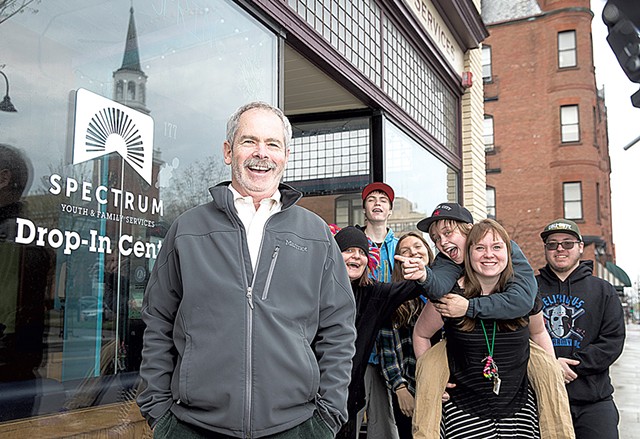Switch to the mobile version of this page.
Vermont's Independent Voice
- News
- Arts+Culture
- Home+Design
- Food
- Cannabis
- Music
- On Screen
- Events
- Jobs
- Obituaries
- Classifieds
- Personals
Browse News
Departments
Browse Arts + Culture
View All
local resources
Browse Food + Drink
View All
Browse Cannabis
View All
-
Culture

'Cannasations' Podcaster Kris Brown Aims to 'Humanize'…
-
True 802

A Burlington Cannabis Shop Plans to Host…
-
Business

Judge Tosses Burlington Cannabiz Owner's Lawsuit
-
Health + Fitness

Vermont's Cannabis Nurse Hotline Answers Health Questions…
-
Business

Waterbury Couple Buy Rare Vermont Cannabis License
Browse Music
View All
Browse On Screen
Browse Events
Browse Classifieds
Browse Personals
-

If you're looking for "I Spys," dating or LTRs, this is your scene.
View Profiles
Special Reports
Pubs+More
Spectrum Director Mark Redmond Tells Tales for Troubled Youth
Published May 3, 2017 at 10:00 a.m. | Updated July 6, 2021 at 1:43 p.m.
Mark Redmond waited patiently in the wings at Flynn MainStage while a barmaid told her story of getting robbed at gunpoint, a gay motorist confessed his crush on a traffic cop and a cyclist for a lesbian-owned delivery company recounted witnessing a stabbing while delivering a box of vulva puppets.
It was Friday night at the Moth GrandSLAM storytelling championship in Burlington, and Redmond had his work cut out for him. His six-minute tale was about opening a charter school for low-income kids in Stamford, Conn., in 1998. Told late in the program, it wasn't as sexy or dramatic as the stories of his competitors. But, like most of Redmond's stories, it was funny, heartfelt and genuine without being boastful. The audience loved it.
The 59-year-old Irish Catholic from Long Island has a gift of gab that's evident onstage, on the radio and in print. His essays and op-ed pieces have been published in the New York Times, Forbes and the Huffington Post, and he's the author of a 2004 book called The Goodness Within: Reaching Out to Troubled Teens With Love and Compassion. That's a clue to his favorite subject: Redmond's words deliver their most powerful punch when he uses them in the service of troubled and at-risk youth.
In his day job, Redmond is the executive director of Spectrum Youth & Family Services. The Burlington-based nonprofit provides young people ages 12 to 26 with a variety of social services, including life-skills training, mentoring, mental-health and substance-abuse counseling, and housing. Many discover Spectrum through its teen drop-in center and health clinic on Pearl Street, half a block east of Church Street.
Redmond's clients are among Vermont's most vulnerable youths. Many grew up in the foster care system or left home to escape abuse and neglect. Some have lived on the streets for years. Some are addicted to drugs or alcohol or have had run-ins with the law.
In many American cities, this population doesn't elicit much public sympathy or resources, especially once the kids turn 18. In Burlington, by contrast, Spectrum now serves more than 1,500 young people annually. And Redmond, who took the job in February 2003, has been particularly effective at building community awareness and support.
In his first year on the job, the nonprofit raised $49,000 in donations and was 97 percent reliant on state and federal grants. Today, tax dollars make up less than half of Spectrum's budget. In March alone, the nonprofit raised $350,000 through its sixth annual Spectrum Sleep Out fundraiser, up $100,000 from last year.
What's the "secret sauce" in Redmond's success? In a word: storytelling.
"If I can get the person in and show them and tell them what we're doing, I think they're going to want to support us," he said.
That narrative element runs through all of Spectrum's newsletters and fundraisers. Every one features personal testimonials from current or former clients about how the organization changed their lives.
When Redmond shares people's stories, donors seem to come out of the woodwork. In November 2004, he wrote an op-ed piece for Forbes lamenting that charities like his struggled while philanthropists made gifts to well-endowed colleges, such as a recent $60 million donation to already-wealthy Middlebury College. After the piece was published, checks poured in from around the country.
"I still get donations from people I never met," Redmond said. "A guy in Texas, $5,000 a year. Another guy in Westport, Conn., $15,000 a year. I finally went out of my way to meet him."
"He's sort of magical," said Katie Langrock, president of Spectrum's board of directors and COO of Commando, the South Burlington-based women's underwear company. "Mark is this unique combination of being completely authentic and being a skilled storyteller. He talks about the impact that donations have on the lives of individuals — one person at a time."
Redmond doesn't just advocate for his own constituency. Rita Markley runs the Committee on Temporary Shelter, Vermont's largest service provider for homeless adults and families. She said she appreciates Redmond's focus on poverty and his efforts to combat chronic homelessness.
"He's able to see how the challenges that a 14-year-old faces are going to set them up to be the person they are 40 years later, when they're huddled in a doorway on Church Street," Markley said.
Redmond's reach extends well beyond Chittenden County. At the state level, too, officials see him as a passionate advocate for young people, unafraid of rattling cages and telling it like it is. At times, that has meant biting the hand that feeds him, as when he's criticized the Vermont Department for Children and Families, which partners with Spectrum on some of its programs.
"He's not shy about letting us know when we should do something more or differently in terms of our services and programs," said DCF Commissioner Ken Schatz. "I know Mark is coming from a place where he wants the best things for children, so we clearly have common goals."
If Redmond has any major detractors in Vermont, they're hard to find — or didn't respond to a reporter's interview requests. Yet his insistence on forging personal connections with Spectrum clients hasn't been to everyone's liking. As a consequence, the organization has lost a few employees, according to longtime Spectrum staffer Justin Verette.
Redmond is more than just a skilled administrator whose New York brashness gets people to write him checks. He's also willing to get his hands dirty. During his more than three decades of working with troubled youth, Redmond has pissed off some scary characters, including some within his own organization.
In the early '90s, while running a residence home for homeless and runaway young men in a sketchy neighborhood of Brooklyn, N.Y., he exposed theft and corruption among several shelter employees and became the target of their attacks on his character — and death threats. Luckily for him, he said, the worst blow he suffered was a smashed windshield.
"A lot of people don't know the work he's done to get here," Verette said. "He's been on the front lines."
Madison Avenue to Mean Street
click to enlarge 

- James Buck
- Mark Redmond at Spectrum's Drop-In Center, where he cooks dinner once a month
Redmond's own trajectory began very differently from those of his clients. He grew up the oldest of five children in an affluent family in East Islip, N.Y. His mother worked as a secretary at St. Christopher-Ottilie Children's Services in Brentwood, N.Y. His father was vice president of the real estate brokerage division at Merrill Lynch.
After graduating from Villanova University in 1979, Redmond landed a prestigious job on Madison Avenue. He was admitted into an elite three-year management-training program at Metropolitan Life Insurance and took an apartment on Park Avenue.
About 18 months into the job, Redmond was back at Villanova visiting a friend when she dragged him to a volunteer-recruitment event. There, Redmond met Marge Crawford, who was looking for volunteers to work at Covenant House, a shelter for runaway and homeless teens in New York City's Times Square. A few weeks later, Crawford gave him a tour.
In 1981, Times Square wasn't the glitzy, family-friendly tourist attraction it is today. It was ground zero for prostitution, weapons, drugs, homelessness and pornography. That year, Rolling Stone dubbed the square's West 42nd Street "the sleaziest block in America."
Redmond signed up for a Tuesday night volunteer shift. He handed out snacks and shot hoops with the teens. Then, without really asking his permission, Crawford signed him up for a weeklong orientation for volunteers willing to live and work full time in Covenant's tenement house. Initially reluctant, Redmond gave it a try. He didn't realize that week would change the course of his life.
Within weeks, Redmond quit his high-salaried job at MetLife, gave up his Park Avenue apartment, and moved into a roach- and rat-infested tenement across from a strip club and a crack house. His stipend: $12 a week. When a Long Island friend came to visit, he thought Redmond had lost his mind.
Without formal training or experience, the 23-year-old was assigned to supervise 40 mostly African American and Latino boys whose childhoods were worlds away from his tennis-club upbringing. As Redmond admitted with a laugh, "I didn't have a clue what I was doing!"
Among the first people he met was Tony Turner, a homeless black youth from Harlem whom Redmond described as a "rough character" with a reputation for drug dealing and other criminal activities. About two months after his arrival in '81, Turner was permanently banned from Covenant House for showing up high on PCP, aka angel dust, and overturning tables. Several months later, Redmond ran into him in Times Square, where Turner was handing out brochures for a strip club.
That wasn't the end of the story, though. Redmond left Covenant House in November 1983 and married a coworker the following year. While working on his master's degree in public administration at New York University, he attended a fundraiser at a Greenwich Village soup kitchen. There he ran into a Jesuit chaplain who mentioned he'd met Turner at Rikers Island, New York City's massive jail complex. Redmond went to visit Turner that very week.
As Redmond told it, Turner walked into the visitors' room and was astonished to see him. Redmond jotted down his home address and invited Turner to stay in touch. Throughout the late 1980s and early '90s, the two exchanged letters. Redmond would send Turner his favorite Little Debbie cupcakes and even drive hours north to visit him at another prison, the Clinton Correctional Facility in Dannemora, N.Y.
After Turner's release in 1992, he and Redmond made periodic plans to meet at Ray's Pizza on 48th Street and 7th Avenue in New York City. About half the time, Turner wouldn't show, as he was using drugs again, Redmond said. When that happened, Redmond felt like giving up, but he never did.
Once, when Turner did make it, the two caught a movie together. Afterward, Redmond recalled, Turner said to him, "Wow! This is the first time in years that I've had fun without getting high."
In 1998, Turner called Redmond and asked him to meet at an address in Harlem. When Redmond and his then-13-year-old son from his first marriage, Aiden, showed up at the address, they discovered it was a church. Turner was waiting outside.
He escorted them down to the basement, where a Narcotics Anonymous meeting was about to begin. It was Turner's one-year anniversary of being clean, and he wanted Redmond there for the occasion. When it was Turner's time to speak, he stood up and thanked his sponsor and several others, then pointed to Redmond, saying, "I wouldn't be alive if it weren't for that person there."
"If I were forced to bring one memory with me into the afterlife," Redmond recounted in a December 2015 episode of his podcast So Shines a Good Deed, "it very well may be the memory of being in that church basement with my son, listening to Tony say that about me."
The two men are still friends. Reached by phone at his Brooklyn apartment last week, Turner said he's been drug-free for 19 years now. He owns a small clothing business and has sole custody of his 17-year-old daughter. Redmond, the girl's godfather, sends her Christmas and birthday presents each year, Turner noted.
Asked why he thinks Redmond kept faith in him all those years, Turner said, "God blessed him with a good heart. That's what it is. Mark sees the good in people that they don't see in themselves."
Brother's Keeper
After Redmond finished at NYU in 1986, he took a job at a homeless shelter in the South Bronx called My Brother's Place. The priest who ran it was struggling to keep it afloat.
If Times Square was a scary place in the 1980s, the South Bronx was scarier. Drugs, crime, poverty and violence were widespread; paramedics and firefighters refused to go to certain neighborhoods because they attracted gunfire. As a consequence, arsonists burned hundreds of buildings, leaving much of the area looking like bombed-out London in the 1940s.
Amid that mayhem, one date is seared in Redmond's mind: January 25, 1987. The previous day, he recalled, a shelter worker had informed him that a client needed to be ejected from the premises. A 20-year-old Puerto Rican man named Norberto Torres had shown up high on crack cocaine and torn up the place. Redmond described Torres as a smart and "very nice person" — when he was sober. When he was high, it was another story.
Late on the 25th, after the Super Bowl, Redmond got a phone call from the shelter. Torres had returned earlier that evening, again high on crack, and stabbed to death Sister Virginia Thomann, a 65-year-old Catholic nun who lived there. Torres was arrested immediately and charged with second-degree murder.
The case was splashed across the pages of every New York City tabloid. Redmond didn't attend the trial, but after Torres was convicted, in May 1988, he wrote to the judge and asked for leniency in his sentencing. As Redmond explained, the Sisters of the Good Shepherd, Thomann's religious order, had immediately forgiven him.
"It was like talking to Mother Teresa," he said. "They harbored no ill will at all."
Largely owing to Redmond's letter and the nuns' clemency pleas, Redmond said, the judge sentenced Torres to the statutory minimum sentence for such a violent offense: 15 years to life.
Most people might have given up on Torres at that point, but Redmond stayed in touch by mail with his former client over the ensuing years. In 1998, while driving through Orange County, N.Y., he stopped at Otisville Correctional Facility and paid Torres a visit. Redmond said he was Torres' first visitor in a decade.
Redmond's second wife, Marybeth, recalled how she first learned of this improbable relationship. In the fall of '98, while she and Redmond were on their second date, she asked him about his plans for the holidays. Redmond informed her that he would be driving to Otisville to visit an inmate. Then he shared the story of Sister Virginia's murder.
Happily for Redmond, that wasn't a relationship deal breaker: He and his date shared both a Catholic background and a zeal for social justice. Marybeth Christie had grown up in Brightwaters, N.Y., just two towns over from Redmond, and even attended her junior prom with her future husband's younger brother, Brian.
The pair connected while Marybeth was working as a journalist for News 12 Connecticut. By then divorced from his first wife, Redmond had just started working in Connecticut for Domus, a nonprofit foundation that ran charter schools and housing for kids in foster care and juvenile detention. The founding of its Stamford middle school was the subject of his Moth GrandSLAM story last Friday.
The couple got engaged six months after their first date and married in May 2001. Marybeth said they often describe themselves as "Dorothy Day and Oscar Romero Catholics," a reference to two of the religion's most prominent social-justice activists. Accordingly, she went on, it didn't seem odd to her that Redmond had forgiven Torres for his egregious sins.
Behind bars and away from the allure of drugs, Torres became a model prisoner. The Redmonds paid his tuition as he worked toward an associate's degree through a correspondence program at Ohio University. They helped him with his parole petition once he was eligible.
Then, once every two years for a decade, Redmond drove to the prison for Torres' parole board hearings and testified for his release. The convict's parole package included letters of support from the Sisters of the Good Shepherd. Every time, the parole board rejected his petition based on the violent nature of his offense.
In 2009, on his fifth try, Torres was paroled after 20 years behind bars. According to Redmond, a Catholic nun cast the deciding vote in the two-to-one ruling. When Torres walked out a free man, Marybeth and Mark Redmond were at the prison gate to greet him. They set him up with a new wardrobe, a job, housing and even a bank account to begin his new life.
Burlington Beckoned
In 2003, after nearly two decades of working in homeless shelters, charter schools and group homes, Redmond was ready for a leadership position. When he heard through a New England network of nonprofits that an executive directorship had opened at a Burlington youth organization, he applied for the job. Marybeth was initially skeptical about the prospect; both of them already had good jobs, and she was pregnant at the time. Their son, Liam, was born five days before Redmond's first interview for the job.
During his interview process, Redmond said, Spectrum's board members were candid about the organization's serious financial challenges and poor public image. Many downtown merchants would have preferred to see Spectrum disappear, he recalled. They viewed its clientele as a nuisance and eyesore on the Church Street Marketplace, and the teen drop-in center was considered a locus of unsavory activity.
Despite such challenges, Redmond accepted the job offer and moved to Vermont, with his wife and newborn, in February 2003. The morning they arrived, NBC's "Good Morning America" noted that Burlington, at minus-30 degrees, was the coldest city in America that day.
Ron Redmond (no relation to Mark) has been director of the Marketplace since December 1998. Though he had nothing disparaging to say about Redmond's predecessor at Spectrum, Will Rowe, he said, "When Mark arrived, it was a breath of fresh air, because he accepted a level of accountability that we really appreciated."
In those days, Spectrum's relationship with the Burlington Police Department was "adversarial," recalled Mike Schirling, who spent 26 years at the cop shop, his last seven and a half as chief. Now Vermont's commerce secretary, Schirling said Spectrum staff often took a "line-in-the-sand" approach when officers needed to speak with their clients. Sometimes, he said, police would pursue a suspect to Spectrum's door only to be turned away by shelter workers, who wouldn't even confirm the individual was inside.
During his first week on the job, Redmond arranged a meeting with BPD and asked for feedback. Schirling, a lieutenant and area commander at the time, told Redmond that Spectrum's residential home on Murray Street had become a "magnet for problems," including drugs, parties and fights.
"He made that one of his first orders of business," Schirling said. "He was immediately responsive to our concerns and turned it right around."
Redmond's "commonsense approach" to law enforcement concerns reversed the way police treated Spectrum's clients, recalled Verette, who has worked at Spectrum on and off for almost two decades. Spectrum staff began going on ride-alongs with the cops and giving them presentations on issues their clients faced. Within a year, Verette said, downtown officers were stopping by the drop-in center just to check in. And they'd always ring the bell first and wait to be admitted.
"At the end of the day," Verette added, "[Redmond] ensured that our guys were treated with dignity and respect."
Another early priority of Redmond's, Verette said, was revamping the drop-in center, which he said had become "a little stagnant." It offered few activities for teens, it looked seedy, and young people loitered outside. Redmond directed Verette to invest in professional-looking signage, a fresh coat of paint and some decent furniture.
One of Redmond's biggest changes, Verette suggested, was promoting a hands-on approach by example. Prior to the director's arrival, some staff in Spectrum's administrative offices on Elmwood Avenue avoided the drop-in center and had no contact with their clients.
"They were afraid of the kids," Verette explained. That was not Redmond's style. "Mark was all over it. He was like, 'I'll cook!'"
That aptitude was evident on a Friday evening last month, as Redmond stood behind a kitchen counter wearing a Spectrum apron and putting finishing touches on his chicken tikka masala. He ladled out heaping mounds of food for the dozen or so youths in the room. Redmond high-fived and hugged the kids he knew well and introduced himself to the ones he didn't.
Among the former was Makayla Merchant, a smiling 19-year-old who's been coming to the drop-in center for two years. Over that time, she said, she's accessed virtually every service Spectrum offers, including its mentoring program, youth development program and transitional housing. She was especially excited about starting a job at Spectrum's One Stop Detail Shop, a new automotive detailing business in South Burlington that's designed to give clients on-the-job training and employment skills. Verette, who will supervise, expects the business to open in June.
On her left forearm, Merchant sports a tattoo of a jagged heart-monitor line that ends with the words "Just live."
Asked about its meaning, she explained, "I've been through a lot. I look at it, and it just reminds me that my heart is still beating, so I might as well still live."
What role have Redmond and Spectrum played for her?
"Mark is my buddy!" Merchant yelled loudly enough for him to hear. "If it weren't for Spectrum, I don't know where I'd be today."
Unshaken Faith
In his story at the Moth, Redmond recalled the application for the Connecticut charter school he helped found. In it, children had their own one-page section to fill out. Among other things, it asked them to finish this sentence: "I would like you to know that I..."
Most of the kids wrote things like "I'm a Red Sox fan" or "I love my dog," Redmond told the audience. But one 11-year-old boy wrote something that has stuck with him to this day: "I would like you to know that I am not dumb."
"When I read that," Redmond said, "it just reminded me of so many kids I have worked with in poverty for so many years. That all they wanted was someone to believe in them."
Redmond didn't win the GrandSLAM that night; he missed first place by a 10th of a point. But his real victory, he said, is the fate of the charter school he helped launch: It has since added a high school and opened more charter schools in other Connecticut cities.
It would be nice if all of Redmond's stories ended as happily as the one he told at the Moth. But that's not the world in which he and his clients live.
In 2013, four years after Torres was released from prison, Redmond got a call from the man's New York employer. The company was firing him for being high on the job. Redmond immediately phoned his old friend and asked, "Are you using drugs again?" he recalled. Torres admitted he was using cocaine.
In October 2014, Torres was convicted of sexually assaulting a child. Neither Mark nor Marybeth Redmond will discuss his crime publicly, except to say that Torres will spend the rest of his life behind bars. For the Redmonds, it was a devastating setback that tested the limits of their faith.
Redmond put it like this: "Some people just need to be separated from society for the rest of their lives." While Torres' betrayal is the worst he has experienced, he said, he tries not to think about it much anymore. Ultimately, he said, people must live with the consequences of their choices.
Despite that bitter disappointment, Redmond maintains his optimism and underlying belief in the goodness of people. At times, he admitted, his trusting nature hasn't been the best quality in a leader. More than once, he said, he's been warned that an employee or board member was working to undermine his efforts.
In an April 2014 Huffington Post column titled "What Advice Would You Give to a Room Full of Parents?" Redmond offered guidance that reflects his approach to running Spectrum. Believe in kids even when they don't believe in themselves. Set limitations and boundaries. Don't make excuses for kids, and don't try to emotionally rescue them at every turn.
"These are the basics, right?" he said with a laugh.
If he were to write that column today, Redmond said, he might add one more bit of advice: Don't dwell on the kids' failures — or your own. He seems most energized when he's working with young people such as Merchant, whose life story is just beginning a new chapter. And chances are good that this storyteller will help her create another captivating tale.
"Someone asked me recently, 'What's your dream job?'" Redmond said. "I think I may be in it."
The original print version of this article was headlined "A Storied Life"
Related Locations
-
Flynn Main Stage
- 153 Main St., Burlington Burlington VT 05401
- 44.47566;-73.21311
-
 802-863-5966
802-863-5966
- www.flynnvt.org…
-
Spectrum Youth & Family Services
- 31 Elmwood Ave., Burlington Burlington VT 05401
- 44.48134;-73.21389
-
 802-864-7423
802-864-7423
- www.spectrumvt.org
Related Stories
Got something to say?
Send a letter to the editor
and we'll publish your feedback in print!
Tags: Culture, Mark Redmond, the Moth, Spectrum Youth & Family Services, troubled youth, troubled teens, at-risk youth, Spectrum, Flynn MainStage, Flynn Main Stage
More By This Author
About The Author
Ken Picard
Bio:
Ken Picard has been a Seven Days staff writer since 2002. He has won numerous awards for his work, including the Vermont Press Association's 2005 Mavis Doyle award, a general excellence prize for reporters.
Ken Picard has been a Seven Days staff writer since 2002. He has won numerous awards for his work, including the Vermont Press Association's 2005 Mavis Doyle award, a general excellence prize for reporters.
About the Artist

James Buck
Bio:
James Buck is a multimedia journalist for Seven Days.
James Buck is a multimedia journalist for Seven Days.
Speaking of...
-

Ruth Bader Ginsburg Show Comes to the Flynn
Feb 25, 2024 -

At-Risk Young People Get a Monthly Stipend as a Hedge Against Homelessness
Aug 23, 2023 -

All-Star Vermont Musicians Channel Bob Dylan for Flood Relief at the Flynn
Aug 10, 2023 -

Best nonprofit organization
Aug 2, 2023 -

Slick Rick Replaces Arrested Development as Headliner for Burlington's Juneteenth Celebration
Jun 16, 2023 - More »
Comments
Comments are closed.
From 2014-2020, Seven Days allowed readers to comment on all stories posted on our website. While we've appreciated the suggestions and insights, right now Seven Days is prioritizing our core mission — producing high-quality, responsible local journalism — over moderating online debates between readers.
To criticize, correct or praise our reporting, please send us a letter to the editor or send us a tip. We’ll check it out and report the results.
Online comments may return when we have better tech tools for managing them. Thanks for reading.
- 1. Shaina Taub's 'Suffs' Earns Six Tony Nominations, Including Best Musical Performing Arts
- 2. Bianca Stone Named New Vermont Poet Laureate Poetry
- 3. STRUT! Fashion Show Returns After Four-Year Hiatus Culture
- 4. Student Film Documents Failed Plan to Cut Books From Vermont State University Libraries Film
- 5. Adam Tendler and the VSO to Premiere Vermont Composer Nico Muhly’s First Piano Concerto Performing Arts
- 6. The Magnificent 7: Must See, Must Do, May 1-7 Magnificent 7
- 7. Amalia Angulo’s Drawings at Kishka Gallery Suggest and Question a 'Peaceable Kingdom' Art Review
- 1. How a Vergennes Boatbuilder Is Saving an Endangered Tradition — and Got a Credit in the New 'Shōgun' Culture
- 2. Video: The Champlain Valley Quilt Guild Prepares for Its Biennial Quilt Show Stuck in Vermont
- 3. Waitsfield’s Shaina Taub Arrives on Broadway, Starring in Her Own Musical, ‘Suffs’ Theater
- 4. This Manchester Center Family Is a National Show Horse Powerhouse Animals
- 5. Video: 'Stuck in Vermont' During the Eclipse Stuck in Vermont
- 6. Pet Project: Introducing the Winners of the 2024 Best of the Beasts Pet Photo Contest Animals
- 7. Crossing Paths: An Eclipse Crossword 2024 Solar Eclipse















































